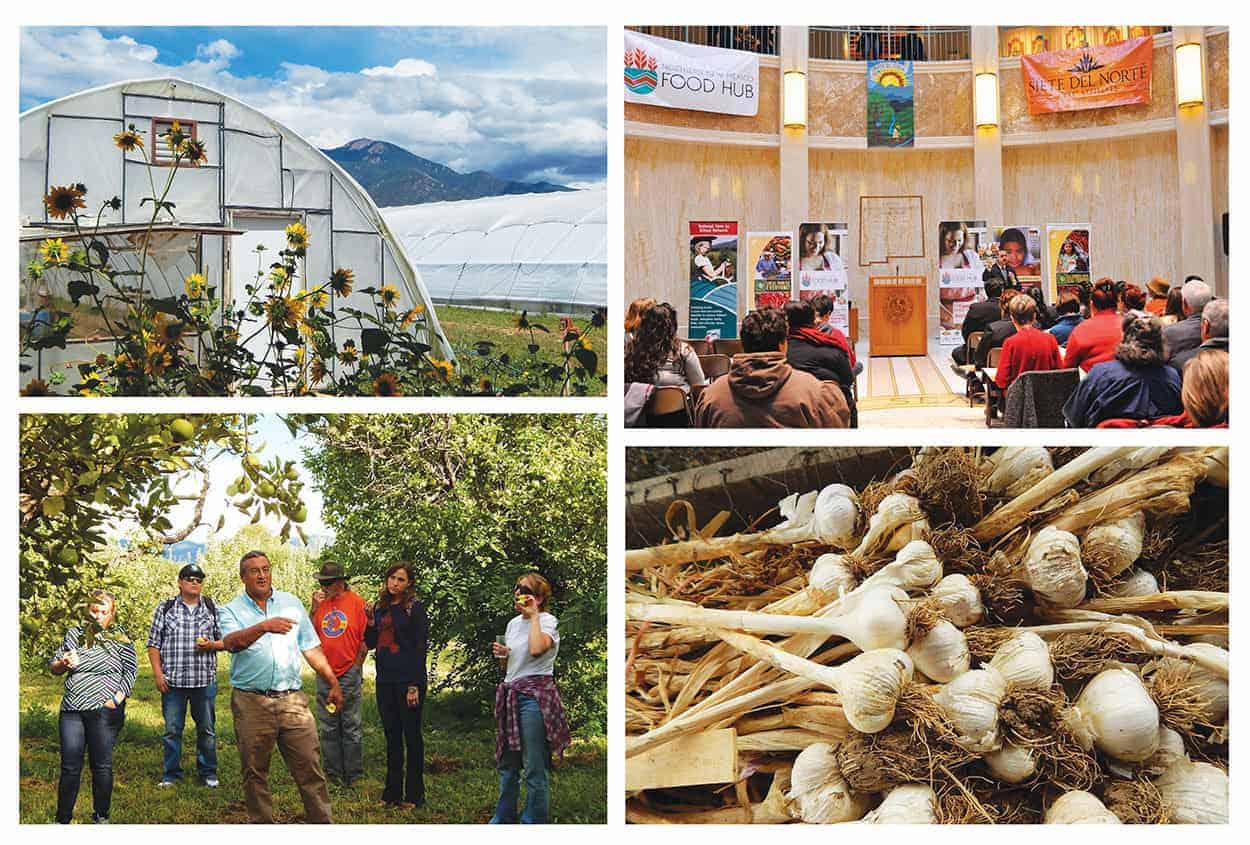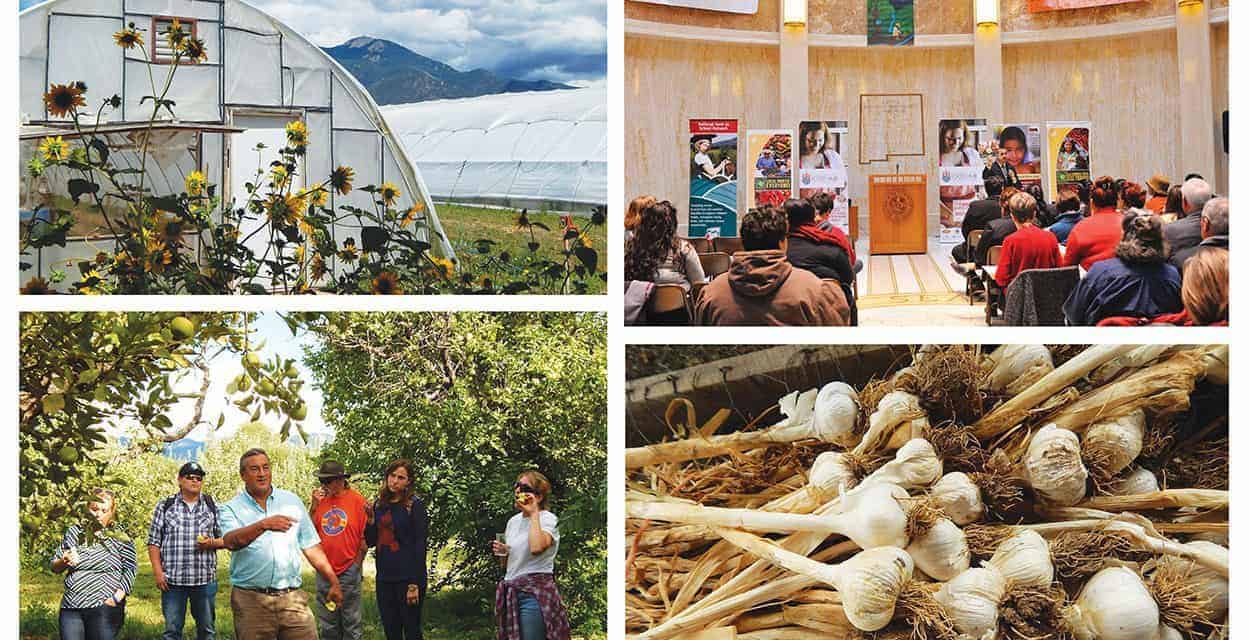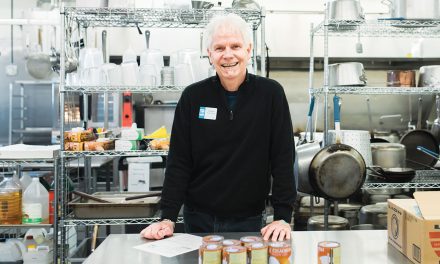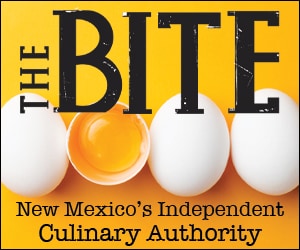Edible recognizes this group of amazing individuals and organizations for their work to create healthy, sustainable food systems in New Mexico. We determine these awards through reader nominations and a reader poll. The local food movement is a grassroots effort that often involves late nights, backbreaking work, dirty fingernails, and being a generally good sport. In an effort to showcase these individuals, organizations, and businesses for their work to build a stronger local economy and a robust local food system, each issue this year spotlights several of the winners with interviews about the work they do.

Top left, clockwise: Farm to School Tour at Red Willow Farm; 2017 Food and Farms Day, at the New Mexico State Legislature; 2016 Garlic at Red Willow Farm; 2016 Farm to School Tour at Wagner Farms. Photos courtesy of Farm to Table.
Farm to Table began its work of promoting locally based agriculture through education, programs, community outreach, and networking more than fifteen years ago. Growing out of the farmers market movement, the founders set their focus on building a Farm to School initiative by bringing farmers together with schools to provide locally grown fruits and vegetables to children at school meals. Of equal importance, working together with strong partners, the organization began supporting community efforts to increase access to healthy and affordable food and linking customers to support programs. Through this mission, they also saw the need to do public policy and advocacy work, so they started the New Mexico Food and Agriculture Policy Council (NMFAPC), a public and private sector partnership, now one of the longest-running food policy councils in the nation. According to co-founder and executive director Pam Roy, Farm to Table was “on the front end of focusing on food deserts in rural communities and worked on some of the first federal legislation to create programs for community-driven programs linking food production to community needs.” Local heroes indeed.
What has been the biggest challenge for Farm to Table? What has been the biggest reward?
Much of our work is long range, which means things don’t change overnight. When working with various communities and complex initiatives, everything takes time. Our Farm to School and policy work are both good examples. Both programs are about building relationships, often with groups and individuals who don’t know each other, yet who may benefit from learning about each other, such as farmers and school foodservice directors. At the same time, a policy or regulation may hinder progress. Changing policy at the local, state, and federal levels takes real commitment and can be complicated. Putting policies into practice is another layer of commitment. That’s why we have to be flexible and have a “long view” approach to what we do. This can also be the most rewarding! After more than twenty-five years in this field, we see how programs that we initiated locally, and even nationally, have come to fruition and benefit many people and communities. And there’s still more to do!
How has the organization changed over time?
We’ve grown with the field and have focused on meeting communities wherever they are in their own life cycle, being committed to helping them build their own capacity to take on projects and resources. In doing so, we’ve helped to facilitate a number of projects until they could spin off on their own. A couple of examples include the farm-to-restaurant program in Santa Fe, now Squash Blossom, and the Southwest Grassfed Livestock Alliance.
As a small organization, little would be accomplished without major teamwork. Collectively, everyone benefits and our belief in partnerships has truly created a family of organizations working to create systemic change. In the last year we’ve focused on what we are uniquely poised to continue—the Farm to School and policy work—while transitioning programs, such as farmer trainings, to other organizations that are best suited to carry them on.
What do you see as your role in the community?
We are deeply rooted in Albuquerque and Santa Fe, but we also define the state of New Mexico and the wider Southwest as our community because of our work alongside a vast network of partners who come from different nations, cultural identities, and backgrounds. We are an evolving organization that always seeks to organize with and alongside communities. Instead of assuming we know best, we ensure our partners are speaking to their own experiences, dreams, and needs. Farm to Table’s unique and important role is playing operator between community members and institutions (food and nutrition services, boards of education, and the state legislature, for example) and helping to facilitate essential day-to-day work, from translating on-the-ground efforts in schools to helping shape policies and systematic shifts that people truly want and need. With our Farm to School work, we want to change the food and educational systems in schools to better serve our students through rebuilding a broken relationship to food and to the land. The only way to do that is to work with folks to design a solution that is best for their context. This manifests as educational school gardens in some spaces, garden-to-cafeteria
programs in others, and a ton of work around advocating for a just school food system statewide. We know that our policy work depends on our on-the-ground experiences of teaching youth in schools, and working with and learning from teachers, parents, and families in the community.

Helen Henry (administration and communication), Pam Roy (executive director and co-founder), and Kendal Chavez (Farm to School director). Photo by Stephanie Cameron.
What are the top three things our readers should know about Farm to Table?
Interesting fact: Farm to Table’s legacy is rooted in the female perspective. From day one our organization has been founded, directed, and managed by a staff of all women.
We believe in the sweet spot where policy, direct service, capacity building, and coalition building meet, and will always do our best to invest in this critical approach to solving complex problems in New Mexico.
We have the honor of co-leading several New Mexico programs of larger national organizations, and we make it a priority to represent New Mexico in an authentic way when among communities that aren’t our own. FoodCorps New Mexico, National Farm to School Network-New Mexico, and Rocky Mountain Farmer’s Union are a few examples.
Who would you like to see get more involved in Farm to Table and how can they participate?
The success of this movement relies on the voices of parents, families, schools, and farmers advocating for themselves and their communities. Without people expressing their needs and concerns around local food in schools to members of the board of education, city council, and state legislature, our collective work will fail. Decision makers need to hear from their constituents that these are not insignificant, surface issues, but rather the foundation we all need to improve our health, build our local economy, and reconnect to the land. Call your school board representative and demand that your child has access to a school garden in their school, write a letter to Governor Martinez and request information on how much the state spends on procuring local food every year, and most importantly keep spreading the essential message of food as medicine, health, and progress to your people.
Anything else you would like to share with our readers?
We want to send infinite gratitude to our dear partners without whom we couldn’t do this collective work (you know who you are). You help to sustain the movement. To the elders, families, teachers, and school staff who nurture our youth to become expansive and curious human beings, our farmers who understand the natural rhythms and rooted ways of being necessary to feed us all every day, the policymakers and agencies that are spokes to the whole wheel, and the youth who are our future. Know that you’re making a difference and that every little thing you do to support and evolve our local food system matters. Keep on keepin’ on!
Edible celebrates New Mexico's food culture, season by season. We believe that knowing where our food comes from is a powerful thing. With our high-quality, aesthetically pleasing and informative publication, we inspire readers to support and celebrate the growers, producers, chefs, beverage and food artisans, and other food professionals in our community.












